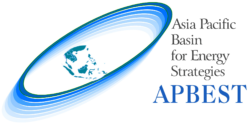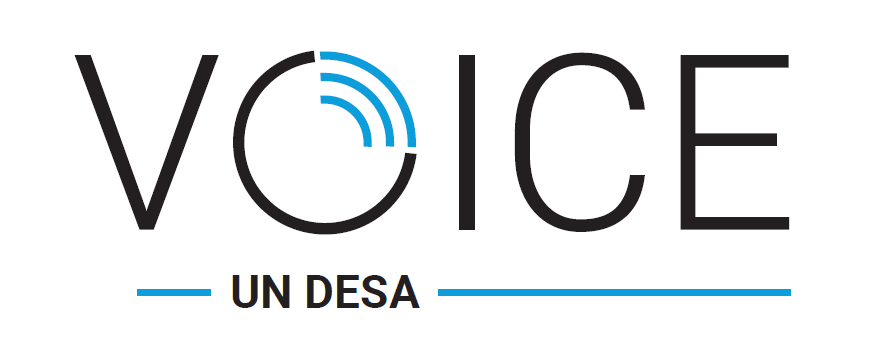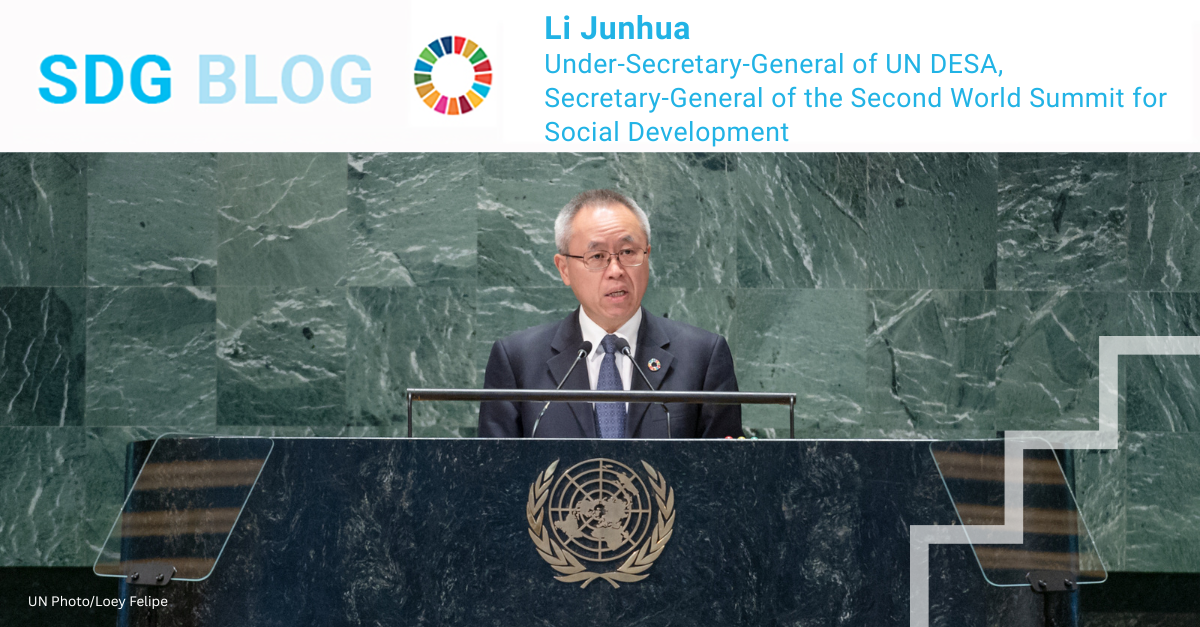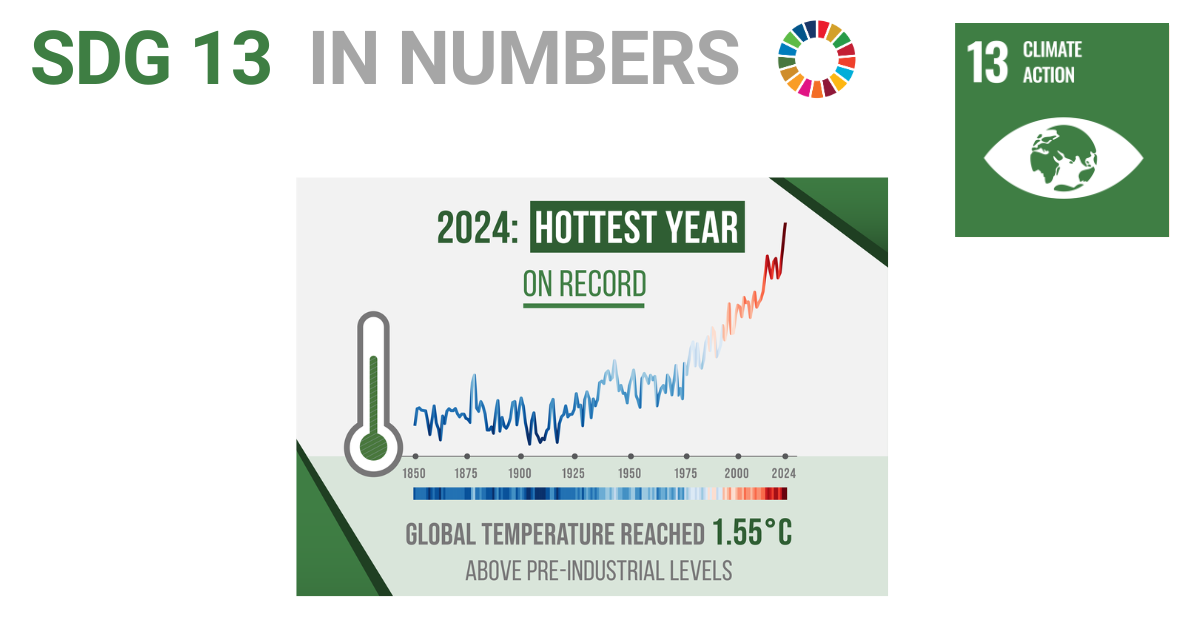Keeping the promise of placing people at the centre of development
“Thirty years ago, the world gathered in Copenhagen and made a promise: to put people at the centre of development. This November, we meet again—this time in Doha—for the Second World Summit for Social Development. This Summit comes at a critical moment,” said UN DESA’s Under-Secretary-General, and Summit Secretary-General Li Junhua, pointing to widening inequalities, eroding trust and communities struggling with conflict and climate shocks.
From 4 to 6 November 2025, world leaders will gather in Qatar for the Second World Summit for Social Development. This journey began in Denmark, in 1995, where 117 countries agreed to the groundbreaking Copenhagen Declaration for Social Development and its Programme of Action.
Since then, the world has seen extraordinary economic and social progress. Over one billion people have escaped extreme poverty; access to healthcare, education and social protection has expanded; people are living longer and healthier lives; more women are able to join the workforce; and young girls can realize their hope for a future of opportunity and promise.
But challenges remain. Growing shocks from climate change impacts, conflicts, or disruptions from changing patterns of trade, production and technology are fueling uncertainty and anxiety. People are growing increasingly insecure, with many people engaged in precarious employment or not earning a living wage that meets their needs. Fueling this insecurity is a growing skepticism of the willingness of governments to put their people first.
People across generations – younger and older alike -are searching for answers to both growing and persistent social development challenges. This Summit will be an opportunity to deliver a response – one that that ensures dignity, provides opportunities, inspires hope and is rooted in action.
At the Doha Summit, Governments will adopt the Doha Political Declaration as the principal outcome. The declaration will reaffirm the centrality of eradicating poverty, promoting full employment and decent work for all, reducing inequality and enhancing social integration. The Declaration takes fully into account new and emerging issues that impact delivery of these objectives, such as digitalization and artificial intelligence, climate change and the global trend of eroding public trust in institutions, among other cross-cutting issues.
But the real success of the Summit will be measured by what happens after. By forging a new global consensus for accelerating social progress through multilateral cooperation, this Summit will ensure that people’s voices and engagement matter. Because in the end, development isn’t just about policies or politics — It’s about all of us.
“I invite you all to follow our efforts and join us in Doha, Qatar, from 4 to 6 November,” said Mr. Li. “Together, let us accelerate social development and make dignity and opportunity a reality for all.”
Learn more about the Summit: Second World Summit for Social Development
View the full programme here using our online platform TeamUp.
Follow Doha Solution and Studio sessions happening on the ground by browsing this site.
Be inspired by commitments made towards the Doha Solutions Platform for Social Development.
Follow efforts and deliberations live on UN Web TV.
https://www.youtube.com/watch?v=OXr25vn6Z0M
Share this!
Expert Voices
What social progress means to people around the world

As preparations intensify for the Second World Summit for Social Development, to be held from 4 to 6 November 2025, the Accelerating Social Progress campaign invited people from all walks of life around the world to reflect on a single question: What does social progress mean to you?
The responses reveal a powerful message: social progress is about people, equality, and hope. Many participants described it as “a world where no one is left behind,” emphasizing the need for access to decent work, quality education, health care, and social protection.
Respondents underscored solidarity and community resilience, highlighted justice, trust, and opportunities for youth, and pointed to equality for women and persons with disabilities as key dimensions of progress.
From young changemakers to older innovators, people shared what progress means in their daily lives, innovation, compassion, intergenerational solidarity, and human rights as the moral core of development. These are the true expert voices: individuals living the realities of change and inclusion in their communities.
Together, their insights reaffirm that social progress is not measured solely by economic growth but by the well-being and dignity of every person. The collective voices gathered through the campaign will help shape the discussions in Doha, guiding efforts to renew political will for the Copenhagen Declaration and Programme of Action.
To capture even more perspectives, the online survey has now been extended until 7 November 2025.
Learn more and share your views here: https://social.desa.un.org/world-summit-2025/news/deadline-extended-what-does-social-progress-mean-to-you
Things You Need To Know
6 lessons from 80 years of UN progress toward sustainable development

As the United Nations marks its 80th anniversary, one story stands out: the world’s journey—through challenges and breakthroughs—toward sustainable development for all. Advancing Together, a new UN DESA report, traces how the UN has helped transform global cooperation, uniting countries around shared goals for people and planet. Here are six key lessons from this journey:
1. From growth to sustainable development
The early decades of the UN focused on post-war reconstruction and economic expansion. Over time, that vision broadened to include social inclusion and environmental stewardship. The journey from growth alone to sustainable development marks one of the most transformative shifts of the UN.
2. From silos to integration
For years, economic, social, and environmental goals were treated separately. Advancing Together shows how they converged—culminating in the 2030 Agenda, where prosperity, equality, and planetary health are recognized as inseparable. True progress means advancing all three together.
3. Collaboration makes change possible
Major global conferences—from Stockholm (1972) to Rio (1992) and Paris (2015)— demonstrate the power of cooperation. Multilateral action through the UN has driven breakthroughs, from defining human rights to advancing gender equality, highlighting that shared challenges require shared solutions.
4. Resilience is key to enduring progress
Rising geopolitical tensions, persistent financing gaps, the widening digital divide, and the spread of misinformation are testing global solidarity. Yet progress continues—from renewed climate commitments to landmark outcomes of the Fourth International Conference on Financing for Development (FfD4)— proving that cooperation can endure even in turbulent times.
5. Foresight, adaptation, and innovation keep us future-ready
Anticipating change has long been a UN strength. UN DESA’s flagship reports help countries identifying risks early and be better prepared for future challenges. Investing in data, science, and digital innovation empowers institutions to adapt quickly and deliver results amid uncertainty.
6. Norms and inclusive multilateralism remain indispensable
Common frameworks—like the SDGs, the Paris Agreement, and the Pact for the Future—translate shared values into collective action. In a divided world, inclusive multilateralism is still the most effective path to tackle challenges no country can face alone, from climate change and pandemic preparedness to digital transformation and inequality.
Read more about this journey in UN DESA’s latest report “Advancing Together. Eight decades of progress towards sustainable development for all” available here.
Photo credit: UN Photo
More from UN DESA
Read more here: https://desapublications.un.org/un-desa-voice/november-2025




